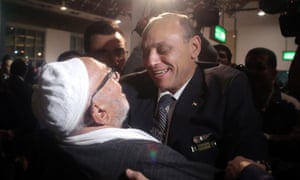
Passengers on board the hijacked EgyptAir plane have been reunited with relatives as they described a terrifying ordeal at the hands of a fake suicide bomber. “He’s crazy,” said passenger Fikry Shenouda of the hijacker Seif Eldin Mustafa, who demanded that flight MS181 change its route from Alexandria to Cairo early on Tuesday morning, and divert to Larnaca airport in Cyrpus.
“We tried to speak to him but he seemed like a lunatic,” he added, attempting to shed light on the hijacker’s motives. “This guy did all this because of his wife, who is in jail – I don’t know if they’re divorced or not. But she’s in jail and he did all of this to try to get her out of prison. And he wants asylum in Cyprus.”
Shenouda spoke minutes after arriving back at Cairo international airport having been flown out of Cyprus along with dozens of other passengers within hours of being freed.
He explained that Mustafa collected the passengers passports before trying to decide who would be forced to stay inside the aircraft on the Larnaca runway.
“At first he was hesitant: he wanted to release all men, then all the women and children, then he decided to release all the Egyptians and just keep the foreigners on the plane.”
Shenouda was forced to leave his Dutch colleague Hoob Helthoes inside the Airbus A320 along with an Italian national, and three British nationals. One man from Aberdeen, Ben Innes, chose this moment to take a smiling photo alongside the hijacker.
Helthoes recounted how he called his wife and son from the runway, believing that the fake explosives belt that Mustafa was wearing was real. “At first, what can you say, I couldn’t believe it,” said Helthoes, as he described his feelings when Mustafa revealed what appeared to be a suicide vest.
“Everything was moving so fast, you can’t really think,” he said, attempting to shrug off the trauma of the incident. “It happened.”
“My brother is one of the flight attendants. He sent a message to our sister, telling her to make our mother pray for us,” said Marwa Fouda, describing how the family had received a string of Facebook messages from her brother Mohammed while anxiously watching the news, all the while speaking to him as the plane was on the tarmac in Cyprus.
“He said at one point that the hijacker had told him ‘if you don’t shut up and sit down right now, I’ll blow up this flight’,” she added.
The passengers and crew of the EgyptAir flight had been flown back to Cairo within hours of being released.
Family members clutched bunches of flowers and old men let prayer beads gently run through their fingers inside the cavernous arrivals lounge at Cairo airport, as they stared through the plate glass, awaiting hugs and tearful greetings.
Many of the families of those on the plane joined others in praising the reaction by EgyptAir staff to the incident.
Nonetheless, questions about the security of Egypt’s airports remain at a time when the country is trying to restore confidence in its security and bring back the once plentiful numbers of tourists. Flights from many European countries and Russia to the key Sinai tourist town of Sharm el-Sheikh remain suspended following the downing of Metrojet flight 7K9268 last October. The State of Sinai, an affiliate of the so-called Islamic State, later claimed responsibility for the attack, which killed all 224 passengers on board.
While Mustafa’s explosive vest later proved to be fake, the incident has been seen by many as undermining Egypt’s efforts to boost airport security, including hiring the British firm Control Risks to assess security in Cairo, Marsa Alam and Sharm el-Sheikh airports.
“There is carelessness – there should be more groups tasked with heightening airport security,” said Shenouda.
Nabil El Amir, the general manager of Cairo airport for Egypt’s ministry of tourism, was asked whether the incident could undermine confidence in Egypt’s ability to ensure safety across its airports.
“I hope not,” he said. “I don’t trust the foreign media, how they’ll deal with this incident. We are doing our best everywhere to prove that Egypt is secure. We’d like foreigners to feel the same.”
No comments:
Post a Comment